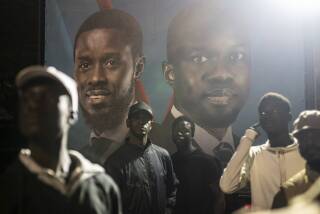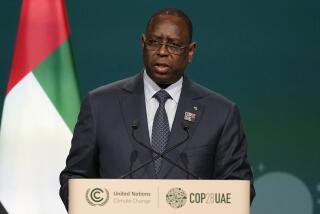Egypt disqualifies 3 leading presidential candidates
CAIRO — Egypt’s volatile presidential race was jolted Saturday when the election commission disqualified three controversial front-runners — the nation’s former spy chief and two impassioned Islamists — just five weeks before voters go to the polls.
The commission removed Omar Suleiman, the intelligence director under deposed President Hosni Mubarak; Khairat Shater, a leading voice for the ascendant Muslim Brotherhood; and Hazem Salah abu Ismail, an ultraconservative Salafi Islamist with wide populist appeal. Seven other candidates were also expelled, and appeals were expected.
Ismail’s followers — students, workers, engineers — are easily roused, and officials worried late Saturday that protesters would take to the streets. On Friday, thousands of Islamists had marched into Cairo’s Tahrir Square to protest Suleiman’s candidacy.
The commission’s decision added fresh turmoil to an increasingly polarized political terrain. The move weakens, in the eyes of many Egyptians, two prominent threats to the country’s emerging democracy: a potent remnant of the Mubarak era and the deepening power of Islamists who control parliament and want to expand the influence of Islamic law, known as sharia.
The Supreme Presidential Election Commission’s verdicts are likely to bolster the candidacy of Amr Moussa, a former foreign minister and Arab League secretary-general who was topping the polls before the recent entries of Suleiman and Shater. Moussa served under Mubarak until 2001 and is not considered as closely connected to the toppled president as Suleiman.
Egypt has been on a discomfiting political ride since Mubarak’s overthrow last year. Ruled by a council of generals, the country has veered from violence to uncertainty even as it lurches through political campaigns and promises of stability. The expulsion of the candidates again reveals the deep scars left by three decades of Mubarak’s oppressive rule.
Suleiman, Shater and Ismail — the race’s most dominant personalities — were all dogged by questions of legitimacy that became more pronounced as electoral oversight intensified in recent days.
Suleiman, who served erratically as vice president in the final days of Mubarak’s government, kicked off his campaign one week ago. He reportedly had the backing of the military and was regarded by his supporters as the ideal foil to the political agenda of Islamists. But he lacked thousands of authenticated signatures to fulfill registration requirements.
Pressure on the former spy chief also tightened days ago when the Islamist-led parliament passed a law forbidding top officials from Mubarak’s regime from running for office. The legislation must be ratified by the military, which appeared unlikely, but the generals may not have wanted to enter a protracted battle with parliament.
Shater, a onetime political prisoner, was a victim of the intelligence agencies Suleiman controlled. He ran his businesses from prison for years and was one of the Brotherhood’s top financiers. He was freed last year and became the political touchstone of the world’s largest Islamic organization. But his convictions on terrorism and money-laundering charges — even though politically motivated — rendered him ineligible.
“Suleiman’s candidacy basically came as an answer to face the Brotherhood’s candidacy of Shater,” said Nabil Abdel Fattah, a political analyst. “Now both are out of the race and the rest of the candidates have relatively equal opportunities.”
Murad Muhammed Ali, a campaign spokesman for Shater, told the news website Ahram Online: “We will not give up our right to enter the presidential race. There is an attempt by the old Mubarak regime to hijack the last stage of this transitional period and reproduce” the old system.
Ismail’s candidacy was layered with its own intrigue. The campaign by the virulent anti-American preacher turned politician has been in trouble following revelations that his mother became a U.S. citizen before she died. Travel documents and California voter registration records confirmed she was issued an American passport.
Ismail won a partial victory last week when an administrative court ruled that it had no proof his mother held dual nationality. But the election commission had earlier stated that it had verified her U.S. citizenship, making him ineligible. The commission has final say on the status of presidential candidates.
“All the major candidates were excluded because of not fulfilling one or two of the legal conditions,” said Amr Hashim Rabee, an analyst at Al Ahram Center for Political and Strategic Studies in Cairo. “I wouldn’t want to jump to any conclusions that they were axed for anything other than legal reasons.”
The disqualifications of the leading contenders revive the chances of Moussa and others, including former Prime Minister Ahmed Shafik. Anticipating Shater would be expelled from the race, the Brotherhood had entered a second candidate, Mohamed Morsi, head of its Freedom and Justice Party. The other notable Islamist is Abdel Moneim Aboul Fotouh, a moderate and former Brotherhood member.
“We are now facing a whole different situation regarding the elections,” Fattah said. “The question will be if supporters of the Mubarak regime along with businessmen and Christian Copts will make a decision to back Moussa or Shafik” to blunt the rise of Islamists.
Amro Hassan in The Times’ Cairo bureau contributed to this report.
More to Read
Start your day right
Sign up for Essential California for news, features and recommendations from the L.A. Times and beyond in your inbox six days a week.
You may occasionally receive promotional content from the Los Angeles Times.







